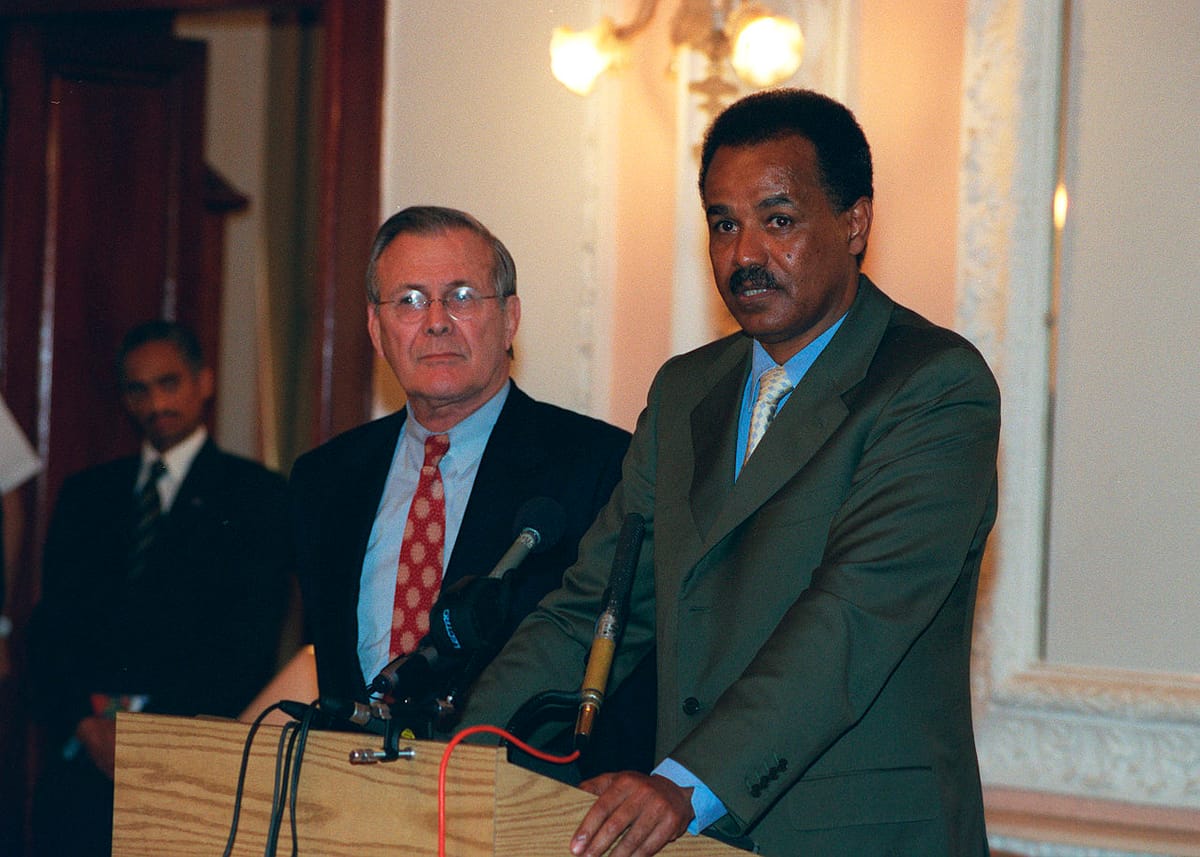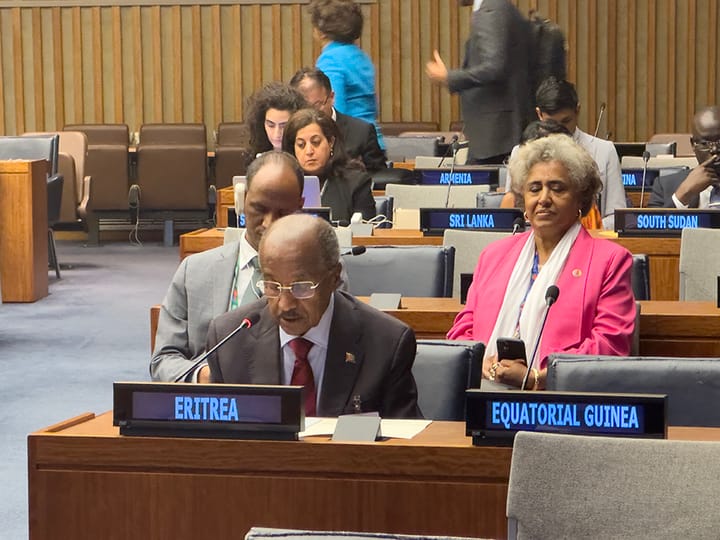What is the significance of the United States recognizing the 23rd anniversary of the Eritrea-Ethiopia Algiers Peace Agreement?
The US recognizing Eritrea Ethiopia's Algiers peace deal hints at major geopolitical shifts in the Horn of Africa and beyond

By Amanuel Biedemariam December 15, 2023
The United States and its Western allies recently released a statement expressing their support for the Algiers Agreement that Ethiopia and Eritrea committed to twenty-three years ago. The statement, released on December 12, 2023, highlighted the importance of respecting the sovereignty and territorial integrity of both countries.
This move has created a buzz among the people of the region, political analysts, and global observers. While it may seem like a simple gesture, its implications are far-reaching and could potentially reshape the US position in the region and its geopolitical standing in the world. The article delves into the possible motives behind the US decision to recognize the anniversary and analyzes the complex geopolitical dynamics driving this sudden action.
Realigning Relations with Eritrea: Could this deliberate recognition of the peace agreement signify a strategic effort by the US to reset ties with Eritrea? Is the aim to pivot towards a more cooperative and amicable relationship? However, considering Washington's history of adversarial actions toward Eritrea, including sanctions and expressed desires for regime change and President Isaias Afwerki's downfall, how might this recent gesture be interpreted? Particularly when contrasted with ongoing efforts to isolate Eritrea and undermine its authority, as outlined in the US State Department's Integrated Country Strategy for Eritrea.
Eritrea has consistently maintained an open policy towards the US. Conversely, the US initially opposed Eritrea's independence and adopted a confrontational stance following its independence.
Is the US now recognizing an unavoidable geopolitical shift amidst the rise of BRICS, the ascent of China, India, and Russia, the re-emergence of regional powers, and the evolving Saudi relations with Iran?
Acknowledging Past Missteps, Mea Culpa: The recent decision made by the US government can be interpreted as an indication of their recognition of past mistakes in relation to the Eritrea-Ethiopia conflict and US policies on Eritrea. The US has taken the side of the Tigray People's Liberation Front in its attempts to weaken Eritrea and reverse independence, and this decision may signify an unspoken admission of that.
Could this belated recognition signal a shift in diplomatic strategy—a willingness to address historical grievances and forge a new path toward reconciliation and collaboration?
The meeting of the Saudi-Chinese-Iranian Tripartite Committee on December 14, 2023, in Beijing has led to a significant improvement in relations between Saudi Arabia, Iran, and China. This recent geopolitical shift might require the US to reassess its approach in the region, which has been dominated by the US since 1941.
Countering Influence: Mitigating Russian and Chinese Influence
Another driving force behind this action is the strategic imperative to mitigate the growing influence wielded by global powers like Russia and China in the region. The US aims to prevent Eritrea from further aligning itself with these influential nations, striving to maintain a more favorable geopolitical balance in the Horn of Africa. The US prioritizes confronting China's perceived detrimental influence within the Integrated Country Approach, given its significant embassy presence in Asmara and active public engagement. The US views Eritrea's engagement in the Belt and Road Initiative with China as a response to American sanctions and aims to counter what they see as preferential treatment in Eritrea's media, highlighting risks associated with Chinese investments in the economy.
Strategic Imperatives: Red Sea Security and Yemeni Conflict
Beyond bilateral relations, this action aligns with the US's critical need for allies along the Red Sea. The escalating threats posed by Yemen's Houthis targeting Israel and US-aligned vessels necessitate a coalition of supportive nations to effectively manage and counter these security challenges. Eritrea's strategic location and potential influence make it a crucial component in safeguarding Red Sea security interests. The US aims to establish a presence in the Red Sea and is engaging in talks to form a maritime task force involving multiple nations, including France, the United Kingdom, Israel, and others. However, responses from Iran, China, and Russia suggest potential opposition to this initiative due to their regional interests.
Addressing the Unraveling Situation in Ethiopia
The current situation in Ethiopia is unstable, and the United States has long seen Eritrea as a source of this instability due to its foreign policies conflicting with American interests. As part of their Integrated Country Strategy, the US government has announced plans to counteract Eritrea's supposed destabilizing activities by supporting regional peace and security. Washington aims to promote initiatives that limit Eritrea's involvement in actions that it claims destabilize the region and encourage Eritrea to withdraw from the conflict in northern Ethiopia.
The recent declaration by the US in support of the Algiers agreement may be a strategic move to address the breakdown of the Ethiopian system. Ethiopia is currently facing several challenges including internal conflicts, socio-political instability, economic distress, famine, and civil war. By acknowledging that Eritrea could have a positive impact on Ethiopia's situation, the US hopes to promote stability in the region by allying with both countries to quell unrest.
Concluding Remarks: The reassessment of US policy towards Eritrea is a complex process that involves various geopolitical, strategic, and regional factors. This review could lead to a significant change in US strategy, which will have a profound impact on the entire region.
Eritrea has always been willing to partner and collaborate with the US based on mutually beneficial terms. This approach of seeking mutual interests and partnerships has been a consistent stance for Eritrea's diplomatic approach. Now, the question arises whether the US is finally realizing the importance of this approach. If the US does embrace this shift, it will not only signify a change in policy but will also transform the dynamics of their relationship.
Such a change will not only redefine bilateral ties but will also have consequences across the geopolitical spectrum it will alter regional dynamics and shape a more stable and cooperative Horn of Africa.
The implications of this potential policy pivot are not limited to diplomatic relations but hold the promise of fostering an environment where both nations can leverage their strengths for mutual advancement.
Ultimately, if the US does embrace this realization, it could mark a watershed moment in reshaping the broader geopolitical landscape, ushering in a new era of collaboration and shared achievements between Eritrea and the United States.
If you want to support the voices of Eritrea and the region, consider donating to and subscribing to Nefasitpost.com.

For all your travel needs, including tickets to Eritrea and Ethiopia, hotel rooms, vacation rentals, and cruises, use our sponsor Selectconcierge.com.




Comments ()